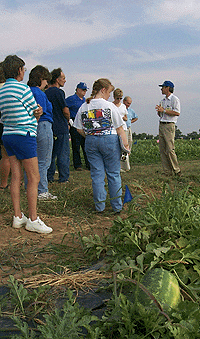UK South Farm Offers Important Research in Urban Setting
UK South Farm Offers Important Research in Urban Setting

It was a sign of the times...strawberry, pumpkin and melon patches sweltering under a late noonday sun against the backdrop of a big city skyline.
That was the setting for the biennial University of Kentucky horticultural field day held at the College of Agriculture's south farm on the outskirts of Lexington.
Talk centered on the drought and the water crisis peaked a lot of interest in the plots using trickle or drip irrigation and black plastic mulches. There were sweet musk melon taste tests, staked tomato trials, tips on bagging apples as a form of insect management and water melon variety tests.
Less then a decade ago, this 80-acre farm near the Fayette county line was bordered on three sides by pastureland and field crops. Today its next door neighbors include two mega-stores and the obligatory entourage of gas stations and fast food service centers.
"But we are very compatible with our neighbors. In fact, this site reflects the location of many of today's Kentucky horticulture and nursery operations," said Dewayne Ingram, chairman of the Horticulture and Landscape Architecture department in the UK College of Agriculture. "This is some of the best soil in the state and also it is located on a high spot which provides good air drainage and keeps frost at bay," said Rick Durham, UK Extension specialist in Home Horticulture. "It is great for perennial horticulture crops."
The farm also is convenient. It is a ten to fifteen minute drive to the main campus and easily accessible.
The Kentucky horticulture industry, through the Kentucky Horticulture Council, has asked for additional funds for the farm to improve the infrastructure with such additions as more green house space, a classroom, and student housing. Such additions would enhance the long term impact of UK's horticultural program.
For local producers seeking an edge on outside competition, some of the research information coming off this land may be as rich as the soil.
For instance, Douglas Archbald, fruits researcher in the UK Horticulture department, is trying to upgrade the Kentucky strawberry crop by using the plastic culture system which includes such tools as plastic trickle irrigation equipment, black plastic mulch and raised beds.
"To this point, strawberries have only been a break -ven proposition for Midwestern farmers as compared to the south where the berries produce for a longer period of time," said Archbald.
"We are also doing some post-harvest strawberry storage work. U-pick markets have been rather flat over the last couple of years and the alternative is to pick the crops and then take them somewhere and sell them," added Archbold.. "We are looking at how different varieties of strawberries react to cold storage and we now have some good information on which varieties can be stored."
UK Graduate student Jennifer Vires showed off different strains of echinacea, known by gardeners as purple cone flowers, which she is researching to find which have the most active ingredients for use in the herbal and pharmaceutical industries.
John Strang, UK Extension horticulturist, gave field day participants a tour of the plots being used to evaluate a large group of watermelon and pumpkin varieties.
There were seventeen watermelon varieties on trial. Strang is looking for the ones that showed high-quality characteristics such as good germination, soft seeds and high sugar content.
Strang also was searching for pumpkin varieties resistant to Powdery mildew. The disease kills the leaves on the plant and causes the pumpkins to be thin-walled and shortens their storage life.
Brent Rowel and Terry Jones are in search of a great Kentucky tomato. Rowell, a UK Extension specialist in vegetable production, set out fourteen varieties of tomatoes at the south farm. Jones, his counterpart who works at the Robinson Station in Jackson, has set out the same plots at the eastern Kentucky station. They are looking for a large, high-quality, good tasting slicing tomato that will be a big seller in the Kentucky market and beyond.
Gerry Brown, UK Extension fruits specialist at the Princeton Research and Extension center teamed up with Rick Bession, UK Extension Entomologist to discuss successful apple varieties and to show how homeowners can bag apples on the tree to protect them from insects.
Bob Anderson , UK Extension floriculture specialist, is examining sub-irrigation systems for vegetable and flower transplant production. Future research at the UK south farm will focus on horticultural crops that have shown a strong potential in the state and the technology needed to make them grow. Look for additional work on crops such as sweet corn, tomatoes, pumpkins, peppers, cabbage, winter squash, , and fruit crops such as apples, strawberries and fall bearing blackberries.
"We envision the south farm being a place for hands-on educational experiences for county Extension agents, new growers, and undergraduate and graduate students," said Ingram.
"It will take a combination of things to make hort work in this state. We have to have research at the experiment station to discover and adapt the appropriate technologies for Kentucky. Then we have to be able to demonstrate those findings on this farm," said Ingram.
"Finally, we need to demonstrate these successful techniques on private farms. These farm demonstration plots have proven to be a very effective way to convince producers to try new methods for growing vegetables," added Ingram.
"We are poised to make a significant impact on Kentucky agriculture...it is our time at the plate and we need to invest significantly in horticulture research and education to support and expand this industry," said Ingram.